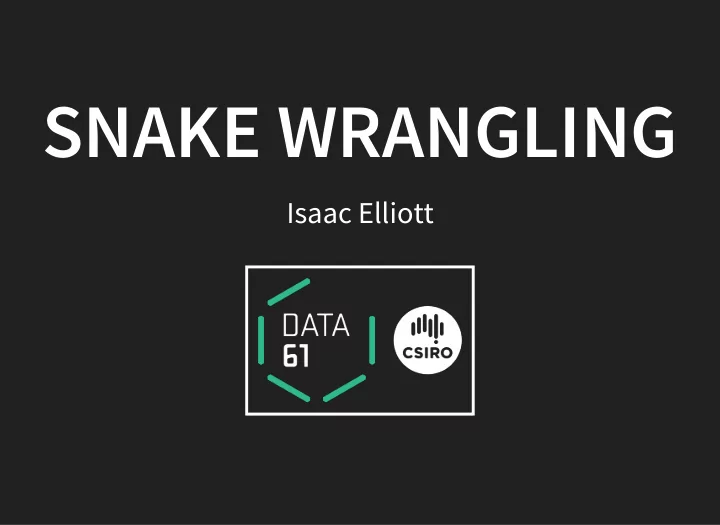

SNAKE WRANGLING SNAKE WRANGLING Isaac Elliott
How can we bring the benefits of better languages to existing codebases?
Language tooling
Language tooling for Python
append_to :: Statement append_to = def_ "append_to" [ p_ "element", k_ "to" (list_ []) ] [ expr_ $ call_ ("to" /> "append") [ "element" ] , return_ "to" ]
def append_to(element, to=[]): to.append(element) return to
def append_to(element, to=None): if to is None: to = [] to.append(element) return to
fixMutableDefaultArguments :: Statement -> Maybe Statement
rewriteOn _Statements fixMutableDefaultArguments :: Module -> Module
DESIGN DESIGN
Parse & Print
(print . parse) :: String -> String = id
Write & Check
Optics
PROPERTY TESTING PROPERTY TESTING
Property of plus : for all inputs A and B: A + B == B + A
Parsing, printing, and validating Python source have useful properties
print . parse = id
Shrinking can find minimal counter-examples
You don't need to remember the whole language
Random generation is great for poking programming languages
((((((((((((((((((((((((((((((((((((((((((((((((((((((((((((((((((((((((((((((
CORRECTNESS BY CORRECTNESS BY CONSTRUCTION CONSTRUCTION
If we can construct some data, then that data is correct (by some measure)
Incorrect = type error
Syntactically correct by construction
Python syntax isn't very straightforward
data Expr = Int Int | Bool Bool | Var String | ... data Statement = Assign Expr Expr | ...
Assign (Int 1) (Int 2) 1 = 2
data Expr = Int Int | Bool Bool | Var String | ... data AssignableExpr = AEVar String | ... data Statement = Assign AssignableExpr Expr | ...
{-# language GADTs, DataKinds, KindSignatures #-}
data Assignable = IsAssignable | NotAssignable data Expr :: Assignable -> * where Int :: Int -> Expr 'NotAssignable Bool :: Bool -> Expr 'NotAssignable Var :: String -> Expr a ... data Statement = Assign (Expr 'IsAssignable) (Expr 'NotAssignable) | ...
expr :: Parser (Expr ??)
exprAssignable :: Parser (Expr 'Assignable) exprNotAssignable :: Parser (Expr 'NotAssignable)
data ExprU = IntU Int | BoolU Bool | VarU String | ... data StatementU = AssignU ExprU ExprU | ...
expr :: Parser ExprU statement :: Parser StatementU
validateExprAssignable :: ExprU -> Either SyntaxError (Expr 'Assignable) validateExprNotAssignable :: ExprU -> Either SyntaxError (Expr 'NotAssignable) validateStatement :: StatementU -> Either SyntaxError Statement
Rinse and repeat
But it (mostly) worked... until...
not(condition)
data Expr :: type_stuff -> * where Not :: {- not -} NonEmpty Whitespace -> Expr type_stuff -> Expr type_stuff Parens :: Expr type_stuff -> Expr type_stuff ...
NonEmpty Whitespace -> [Whitespace]
data Expr :: type_stuff -> * where Not :: {- not -} [Whitespace] -> Expr type_stuff -> Expr type_stuff Parens :: Expr type_stuff -> Expr type_stuff ...
Not [] (Parens condition) not(condition)
Not [] (Not [] (Parens condition)) notnot(condition)
Spaces are required between tokens when their concatenation would give a single token
mkNot :: {- not -} [Whitespace] -> Expr type_stuff -> Either SyntaxError (Expr type_stuff)
_Not :: Prism' Expr ([Whitespace], Expr)
_Not :: Prism Expr ExprU ([Whitespace], Expr) ([Whitespace], ExprU)
Expr -> ExprU
CONCRETE SYNTAX CONCRETE SYNTAX TREE TREE
Have the data structures mirror the syntax
Syntax is not code
THE DRAWING THE DRAWING BOARD BOARD
Correct by Construction
Concrete Syntax Tree
Validated/Unvalidated Trees
data Expr (ts :: [*]) = Int Int | Bool Bool | Var String | Not (Expr ts) | ... data Statement (ts :: [*]) = Assign (Expr ts) (Expr ts) | ...
-- raw, unvalidated Expr '[] -- syntax validated Expr '[Syntax] -- indentation & syntax validated Statement '[Indentation, Syntax]
data Indentation validateStatementIndentation :: Statement ts -> Either SyntaxError (Statement (Nub (Indentation ': ts)))
_Not :: Prism (Expr ts) (Expr '[]) ([Whitespace], Expr ts) ([Whitespace], Expr '[])
import Data.Coerce unvalidateStatement :: Statement ts -> Statement '[] unvalidateStatement = coerce
Making 'incorrect' things impossible vs. Making 'correct' things trivial
Modelling how things appear vs. Modelling what things mean
SUMMARY SUMMARY
Property testing is great
We can get pretty far with type-level programming...
...But it's better to err on the side of usability
Instead of making the incorrect impossible, make the correct trivial
Figure out abstractions, rather than sticking to appearances
Mistakes are probably necessary
COOL STUFF COOL STUFF
fact_tr :: Statement '[] fact_tr = def_ "fact" [p_ "n"] [ def_ "go" [p_ "n", p_ "acc"] [ ifElse_ ("n" .== 0) [return_ "acc"] [return_ $ call_ "go" [p_ $ "n" .- 1, p_ $ "n" .* "acc"]] ] , return_ $ call_ "go" [p_ "n", p_ 1] ]
def fact(n): def go(n, acc): if n == 0: return acc else: return go(n - 1, n * acc) return go(n, 1)
optimizeTailRecursion :: Statement '[] -> Maybe (Statement '[])
rewrite optimizeTailRecursion fact_r :: Statement '[] -> Statement '[]
def fact(n): def go(n, acc): n__tr = n acc__tr = acc __res__tr = None while True: if n__tr == 0: __res__tr = acc__tr break else: n__tr__old = n__tr acc__tr__old = acc__tr n__tr = n__tr__old - 1 acc__tr = n__tr__old * acc__tr__old return __res__tr return go(n, 1)
Recommend
More recommend